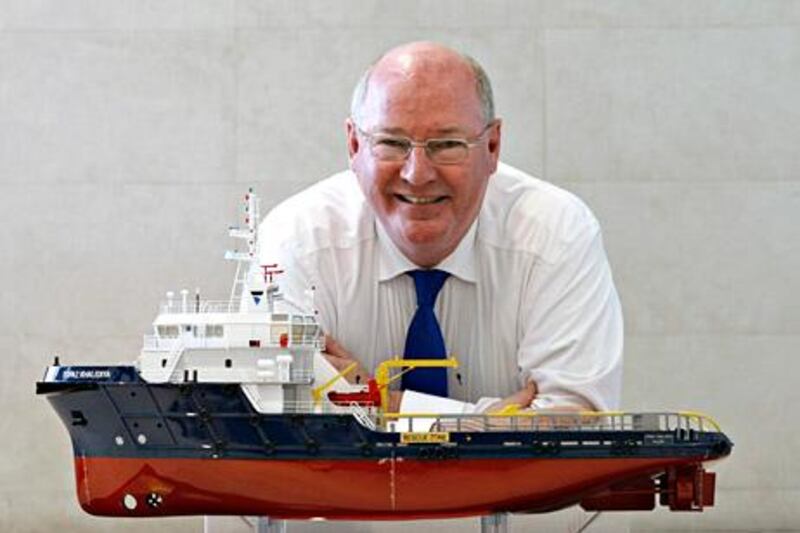This time last year, Stephen Thomas was looking forward to a break and most observers would agree he deserved it.
He had been parachuted in as the chief executive of Topaz Energy and Marine, an oil services group company owned by Oman's Renaissance Services conglomerate of which he was also chief executive, amid a triple whammy of corporate trouble.
Topaz, headquartered in Dubai, had called off an initial public offering in London, it had lost senior executives in circumstances some in the market found worrying and it had just uncovered a multimillion-dollar fraud in an overseas subsidiary.
For Mr Thomas, it had been several months of hectic fire-fighting.
"So much had happened but it's important to point out that the three main events were not connected at all," he says in his office situated near the top of Dubai's Almas Tower.
With regard to the fraud, "It's finished, done and dusted," he says. The perpetrator was an individual in one of the group's central Asian operations who had started syphoning off money even before Topaz bought the business.
"We picked it up when we were rolling out a new code of business conduct. At first we thought it involved an amount of US$2.9 million [Dh10.6m] but actually it turned out to be $1.8m," Mr Thomas says.
"We informed the relevant authorities and retrieved what we could from the individual. Since then, we've closed the loophole and we're certain it can't happen again. Maybe we suffered because we went public on it but when we first discovered it we weren't sure it wasn't the tip of an iceberg.
"And anyway, it's what a public company would have done and it's our desire to behave like a public company," he says.
Which brings us to the second of Topaz's trio of problems last year: the aborted IPO.
The company announced its intention to list on the London Stock Exchange in a flotation worth up to $1.5 billion. It was to be a major event, the first time Renaissance would cash in one of its businesses.
"We had all the advisers lined up and they were really impressed," Mr Thomas says. "But then a range of things happened and sentiment changed: the euro-zone crisis; the Arab spring; the earthquake in Japan. It all made market conditions uncertain and we decided to postpone."
The decision to call off the IPO also exposed fault lines in Topaz's business model and executive infrastructure.
The group consists of two basic units: the marine services business, which supplies ships and other services to oil companies in the Caspian Sea area, the Middle East, West Africa and Brazil; and an engineering business that backs up the group's 100-strong fleet of vessels.
The markets liked the marine side of the operation but did not see the synergy with engineering. In the debate over the IPO and on the future strategic direction of the company, two key executives left. Richard Howes was hired for the IPO as finance director and returned to London six months after the plans were shelved. Separately, the chief executive Fazel Fazelbhoy was dismissed over "a disagreement at a senior level over the direction and focus of the business," says Mr Thomas.
"There were some parts of the business that should never have been included in the IPO and we've closed down or sold some loss-making units. In the organisational restructuring in engineering, we still have some loss-makers and some legacy contracts but we just have to live with that."
The fallout from the aborted IPO has lad to a basic reassessment of Topaz's business, especially in the crucial operations in oil-rich Kazakhstan. "There were some investments that just weren't working for us and we've cut those back and shut down some down where we had a bad couple of years. We've taken one-off hits as a result," says Mr Thomas.
The restructuring of the company continues apace. A new chief executive, the marine oil veteran René Kofod-Olsen, takes charge later this month, working with the experienced chief operating officer Roy Donaldson. Mr Thomas will be concentrating again on Renaissance as chief executive.
Topaz's finances have also been transformed. Loans totalling about $203m have been refinanced as the first phase of a restructuring of $330m of loan agreements.
Renaissance has just clinched a convertible bond offering of $112m, most of it earmarked for investment in the Topaz fleet. Last year, $235m was spent on capital investment by Topaz.
"On a global view, the oil and gas industry is vibrant," says Mr Thomas. "There is strong growth in the Caspian, the Middle East, especially in Qatar, and in North Africa. We are seeing lots of demand in West Africa and we have a base in Brazil now, though it's not profitable yet."
The core business in the Caspian is showing sustained growth of 10 per cent year on year, he says, and its 10-year contracts there, with a substantially new fleet, protects it against cyclical downturns in the oil business.
Might Topaz return to the IPO market?
"It remains an ambition, especially for the marine operations. But London is not the only option this time. We might consider listing in other parts of the [Arabian] Gulf region."
Reviving that ambition shows how far Topaz has come over the past year.
twitter: Follow and share our breaking business news. Follow us
iPad users can read the digital edition of business section as it was printed via our e-reader app. Click here
Topaz chief's annus horribilis ends at last
A gentle start was not for Stephen Thomas when he joined Topaz Energy and Marine - an IPO was called off, senior executives had quit and there was a multimillion-dollar fraud to deal with.

Editor's picks
More from the national




